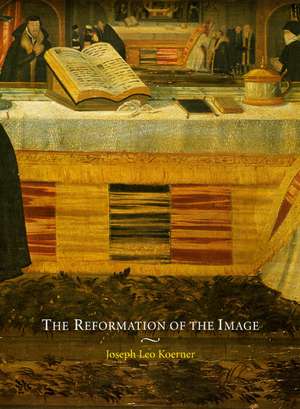The Reformation of the Image
Autor Joseph Leo Koerneren Limba Engleză Paperback – 15 iul 2008
Martin Luther preached the radical notion that we are saved through faith alone. With one stroke, he overturned a thousand years of practice and teaching. Gone was the need for saintly intercessors and a special priesthood or the richly decorated and image-filled churches in which such mediation could take place. What counted now was faith arriving inwardly, in each individual, through the text of the Bible—the naked Word of God itself.
But if words—not iconic images—led the believer to salvation, why didn’t religious imagery disappear during the Reformation? The answer, according to Joseph Leo Koerner’s masterful The Reformation of the Image, lies in the paradoxical nature of Protestant religious imagery itself, which is at once both iconic and iconoclastic. According to Koerner, it is this “iconoclash” that characterizes Reformation art. The Reformation of the Image compellingly shows how visual art became indispensable to a religious movement built on words. It also reveals in Protestant images a powerful instance of modern disenchantment: the disappearance of magic both from images and from the world.
“Unfailingly arresting and inventive . . . it is a long time since a work of art history has kept me so consistently reaching for a pencil to register ardent appreciation or violent dissent.”—Eamon Duffy, London Review of Books
But if words—not iconic images—led the believer to salvation, why didn’t religious imagery disappear during the Reformation? The answer, according to Joseph Leo Koerner’s masterful The Reformation of the Image, lies in the paradoxical nature of Protestant religious imagery itself, which is at once both iconic and iconoclastic. According to Koerner, it is this “iconoclash” that characterizes Reformation art. The Reformation of the Image compellingly shows how visual art became indispensable to a religious movement built on words. It also reveals in Protestant images a powerful instance of modern disenchantment: the disappearance of magic both from images and from the world.
“Unfailingly arresting and inventive . . . it is a long time since a work of art history has kept me so consistently reaching for a pencil to register ardent appreciation or violent dissent.”—Eamon Duffy, London Review of Books
Preț: 396.85 lei
Nou
Puncte Express: 595
Preț estimativ în valută:
75.94€ • 82.74$ • 63.99£
75.94€ • 82.74$ • 63.99£
Carte indisponibilă temporar
Doresc să fiu notificat când acest titlu va fi disponibil:
Se trimite...
Preluare comenzi: 021 569.72.76
Specificații
ISBN-13: 9780226448374
ISBN-10: 0226448371
Pagini: 494
Ilustrații: 16 color plates, 260 halftones
Dimensiuni: 235 x 165 x 28 mm
Greutate: 0.71 kg
Editura: University of Chicago Press
Colecția University of Chicago Press
ISBN-10: 0226448371
Pagini: 494
Ilustrații: 16 color plates, 260 halftones
Dimensiuni: 235 x 165 x 28 mm
Greutate: 0.71 kg
Editura: University of Chicago Press
Colecția University of Chicago Press
Notă biografică
Joseph Leo Koerneris the Victor S. Thomas Professor of History of Art and Architecture at Harvard University. He is the author of Caspar David Friedrich and the Subject of Landscape and The Moment of Self-Portraiture in German Renaissance Art, the latter copublished by the University of Chicago Press.
Cuprins
Timeline
Preface
Introduction
1. Ideas About the Thing
2. A Tragedy for Art?
3. Territorial Battles
4. Appropriations
5. A Reformation Altarpiece
Part I - Cleansing
6. Actions
7. Beliefs
8. Fictions
9. Communications
10. The Arrested Gesture
Part II - The Word
11. The Cross
12. The Outstretched Finger
13. A Hidden God?
14. Crude Painting
15. Preaching
16. Teaching
17. Ubiquity
Part III - Sacrament
18. From Custom to Rule
19. Behind the Mass
20. The Tables Turned
21. Ministry
22. Church Building
Epilogue
References
Photo Acknowledgements
Index
Preface
Introduction
1. Ideas About the Thing
2. A Tragedy for Art?
3. Territorial Battles
4. Appropriations
5. A Reformation Altarpiece
Part I - Cleansing
6. Actions
7. Beliefs
8. Fictions
9. Communications
10. The Arrested Gesture
Part II - The Word
11. The Cross
12. The Outstretched Finger
13. A Hidden God?
14. Crude Painting
15. Preaching
16. Teaching
17. Ubiquity
Part III - Sacrament
18. From Custom to Rule
19. Behind the Mass
20. The Tables Turned
21. Ministry
22. Church Building
Epilogue
References
Photo Acknowledgements
Index
